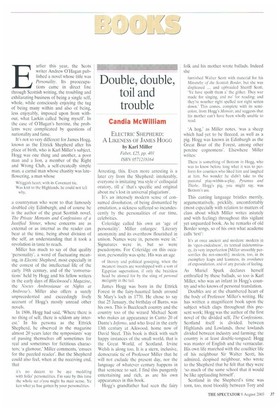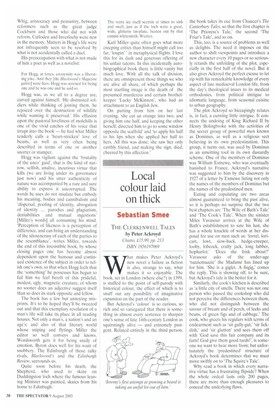Double, double, toil and trouble
Candia Mc William
ELECTRIC SHEPHERD: A LIKENESS OF JAMES HOGG by Karl Miller Faber, £25, pp. 401 ISBN 0571218164 Arresting. this. Even more arresting is a later cry from the Shepherd: intolerably, everyone is imitating 'ma style o' colloquial oratory, till a' that's specific and original about me's lost in universal plagiarism'.
It's an intensely modern sense of consumed dissolution, of being dismantled by emulation, a sickness suffered so incandescently by the personalities of our time, celebrities.
Coleridge called his own an 'age of personality'. Miller enlarges: 'Literary anonymity and its overthrow flourished in unison. Names were in, persons were in.' Signatures were in, but so were pseudonyms. For Coleridge on this occasion, personality was spite. His was an age
of literary and political gossiping, when the meanest insects are worshipped with a sort of Egyptian superstition, if only the brainless head be atoned for by the sting of personal malignity in the tail.
James Hogg was born in the Ettrick Forest in the fairy-haunted lands around St Mary's loch in 1770. He chose to say that 25 January, the birthday of Burns, was his own. This is Buccleuch country and the country too of the wizard Michael Scott who makes an appearance in Canto 20 of Dante's Inferno, and who lived in the early 13th century at Aikwood, home now of David Steel. This book is thick with such happy instances of the small world, that is the Great World, of Scotland. Irvine Welsh is along too. It is a stern, inclusive, democratic tic of Professor Miller that he will not exclude the present day, nor the language of whatever century happens in that sentence to suit. I find this pungently entertaining and rich, as are his own appearances in this book. Hogg's grandfather had seen the fairy folk and his mother wrote ballads, Indeed she
furnished Walter Scott with material for his Minstrelsy of the Scottish Border, hut she was displeased ... and upbraided Sheriff Scott. 'Ye have spoilt them a' the gither. They war made for singing, and no' for reading; and they're nouther right spelled nor right setten down. This comes, complete with its semicolon, from Hogg's Memoir, and suggests that his mother can't have been wholly unable to read.
'A hog,' as Miller notes, 'was a sheep which had yet to be fleeced, as well as a pig. Hogg was known in Edinburgh as the Great Boar of the Forest, among other porcine cognomens'. Elsewhere Miller writes:
There is something of Bottom in Hogg, who was to know before long what it was to perform for courtiers who liked him and laughed at him. No wonder he didn't take to the pastoral play-within-a-play, Pyramus and Thisbe. Hogg's pig, you might say. was Bottom's ass.
This canting language bristles merrily, argumentatively, pricklily. uncomfortably (most especially with relation to matters of class about which Miller writes astutely and with feeling) throughout this vigilant yet unguarded book. As he remarks of old Border songs, so of his own what academe calls 'text':
Ws at once ancient and modern: modern in its 'open-endedness', its textual indeterminacy, its very imperfection [Miller smoothly personifies the not-smooth]; modem, too, in its exemplary leaps and leanness, its avoidance of expostulation, and of any parade of feeling.
As Muriel Spark declares herself enthralled by these ballads, so too is Karl Miller, who was an infant in Hogg's country and who knows of personal translation. Doubles are at the chambered heart of the body of Professor Miller's writing. He has written a magnificent book upon the subject which claps throughout this present work; Hogg was the author of the first novel of the divided self, The Confessions. Scotland itself is divided, between Highlands and Lowlands, those lowlands divided between industry and farming; the country is at least double-tongued; Hogg was master of English and the vernacular. His own life marched with the couthier life of his neighbour Sir Walter Scott, his admired, despised neighbour, who wrote to the Shepherd that he felt that they were 'so much of the same school that it would be like applauding himself'. Scotland in the Shepherd's time was torn, too, most bloodily between Tory and Whig, aristocracy and peasantry, between reformers such as the great judge Cockburn and those who did not wish reform. Culloden and Inverlochy were new in the memory. Matters in Hogg's life were not infrequently seen to be resolved by what is not accidentally called a duel.
His preoccupation with what is not made of him a poet as well as a novelist:
For Hogg, at times, anonymity was a liberating joke. And they [the Blackwood's Magazine galere] were liars. Hogg was scorned for being one and he was one and he said so.
Hogg was, as we all to a degree are, carved against himself, 'He distrusted soldiers while thinking of joining them, he rejoiced over the destruction of wildlife while wanting it preserved.' His effusion upon the pastoral loveliness of molehills is one of the vivid catches of his voice that irrupt into the book — he had what Miller tenderly calls a 'heart-stricken' love of beasts, as well as very often being described in terms of one or another snorter or stamper.
Hogg was vigilant against the 'brutality of the limo' guid', that is the kind of narrow, selfish, unalive, incurious virtue that kills (we are living under its governance just now) and his utter authenticity of nature was accompanied by a rare and sure ability to express it uncorrupted. The words he uses do not insulate but embody his meaning, bodies and cannibalism and 'dispersal, pooling of identity, abrogation of identity parodies and plagiarism, deniabilities and mutual ingestions' [Miller's words] all consuming his mind. 'Perception of likeness is a perception of difference, and can bring an understanding of the idiosyncrasy of each of the parties to the resemblance', writes Miller, towards the end of this irresistible book, by whose closing pages one has become almost dependent upon the humour and continued existence of the subject in order to relish one's own, so that when Hogg feels that the 'something' he possesses has begun to fail him we feel bereft of this prideful, modest, ugly, magnetic creature, of whom no sooner does an adjective suggest itself than so does its stark opposite and fellow.
The book has a few but annoying misprints. It's to be hoped they'll be tweezed out and that this exemplary revelation of a man's life will take its place in all reading houses. Not only a man's, a nation's and an age's; and also of that literary world whose sniping and flytings Miller the editor so well conveys and knows. Wordsworth gets it for being snaily of emotion, Byron does well for his want of snobbery. The Edinburgh of those talky rivals, Blackwood's and the Edinburgh Review, surrounds us.
Quite soon before his death, the Shepherd, who used to skate on Duddingston loch where the famous leaning Minister was painted, skates from his home to Edinbugh:
The verra ice itself seemin at times to sink and swell, just as if the loch were a great, wide, glitterin tin-plate, beaten out by that cunnin whitesmith. Wunter.
Karl Miller quite often goes what more creeping critics than himself might call too far, 'loupin" in metaphysical flights. I love this for its dash and generous offering of his unfair talents. In this incidentally autobiographical hook there is little vanity but much love. With all the talk of division, there are omnipresent those things we who are alive all share, of which perhaps the most startling image is the death of the presumed murderess and certain brothelkeeper 'Lucky McKinnon', who had an attachment to an English Jew.
On parting from him on her last evening, she cut an orange into two, and giving him one half, and keeping the other herself, directed him to go to some window opposite the scaffold' and -to apply his half to his lips when she applied her half to hers. All this was done: she saw her only earthly friend, and making the sign, died, cheered by this affection.'



































































 Previous page
Previous page